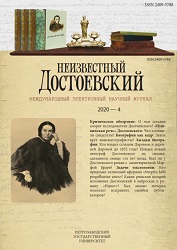«Strepitu belli propelluntur artes»: латинский афоризм Достоевского
Strepitu belli propelluntur artes: Dostoevsky’s Latin Aphorism
Author(s): Anna Aleksandrovna SkoropadskayaSubject(s): Syntax, Russian Literature, 19th Century, Theory of Literature, Stylistics
Published by: Петрозаводский государственный университет
Keywords: Dostoevsky; ancient tradition; Latin; aphorism; quote; paradox; paradoxical hero;
Summary/Abstract: The article examines the Latin aphorism Strepitu belli propelluntur artes, which is found twice in Dostoevsky’s notebooks. The spelling and translation of the aphorism, its grammatical and stylistic structure, as well as the possible sources of the Latin quotation are elucidated. The expression in question is contextually unrelated to the Russian text and functions as an independent statement. The semantic connection of the aphorism with the content of the pages where it is found is revealed. The Latin expression marks the theme of war. The juxtaposition of war and art inherent in the aphorism and traditionally understood as the impossibility of their coexistence, is interpreted by the writer as a paradox: through his paradoxical hero, Dostoevsky fosters the idea that only during a war true art awakens souls and mobilizes a society’s spiritual needs. Subsequently, on his own behalf, the writer speaks about the nature of true art, which arouses people by its lofty ideals in the times of peace. However, the social reality is such that the only way for a spiritually unhealthy society to awaken and cleanse itself is a war over a noble idea. The Latin quotation is a key link in the writer’s reasoning, and it becomes an instrument of his argumentation.
Journal: Неизвестный Достоевский
- Issue Year: 7/2020
- Issue No: 4
- Page Range: 208-221
- Page Count: 14
- Language: Russian

